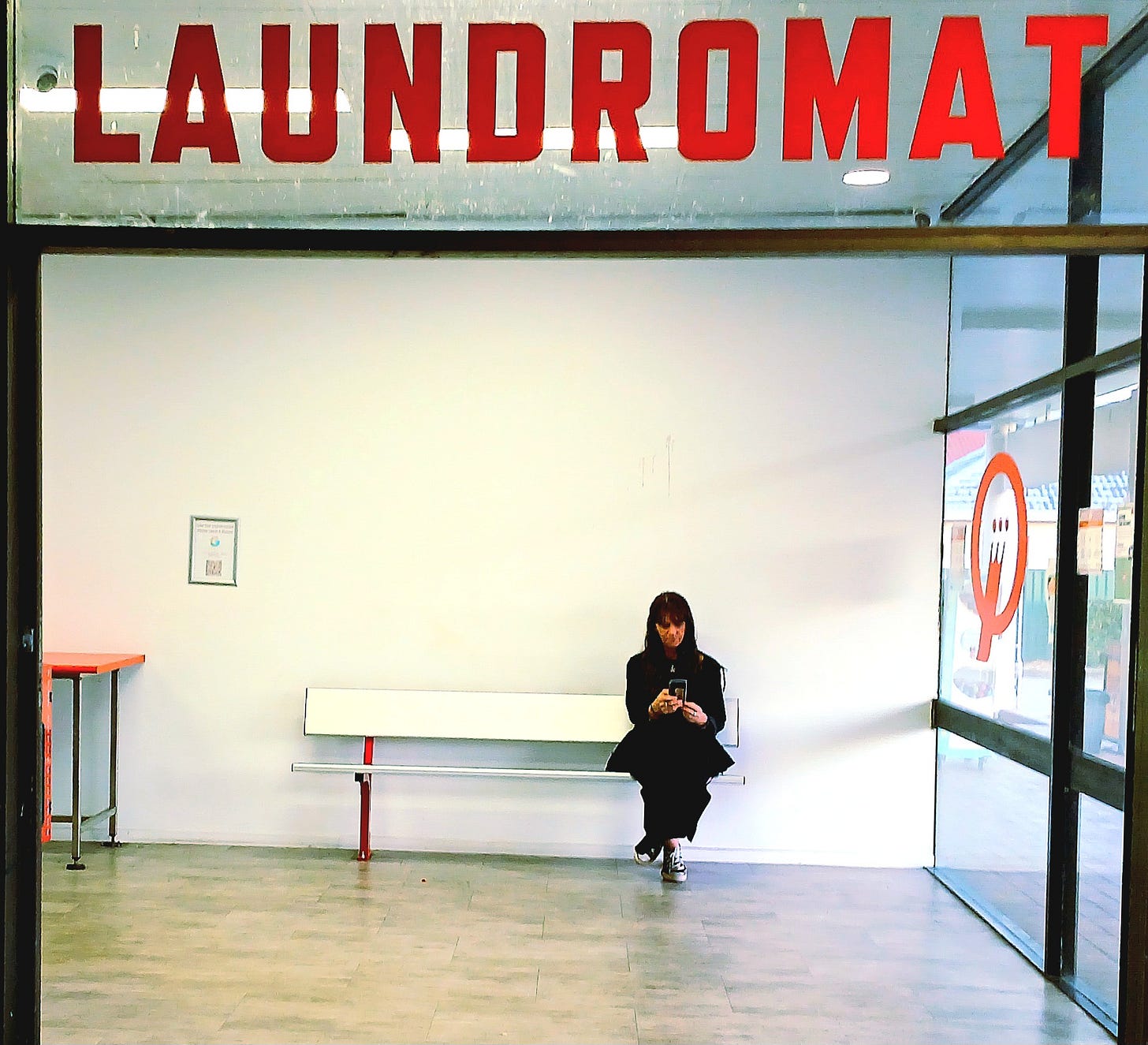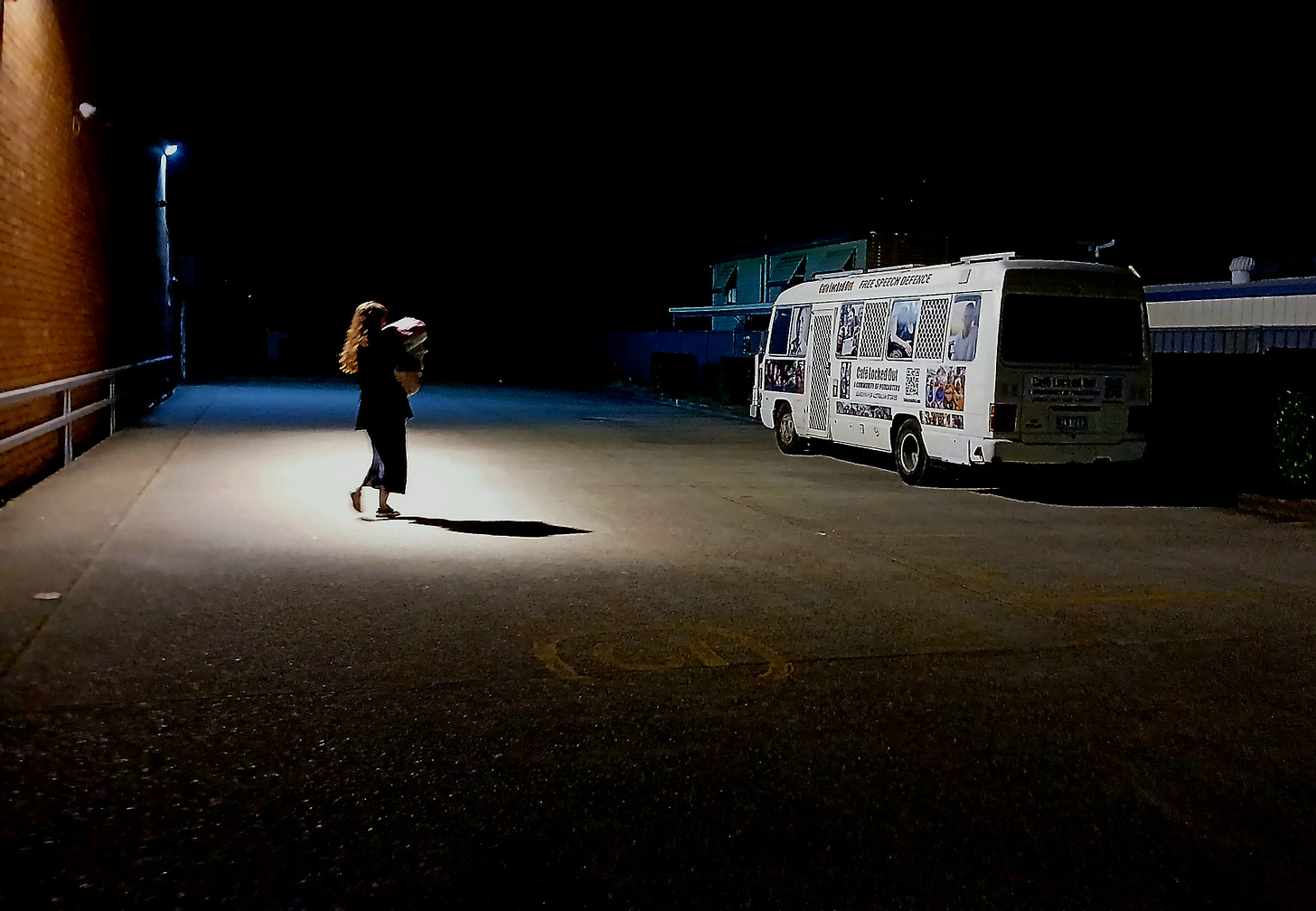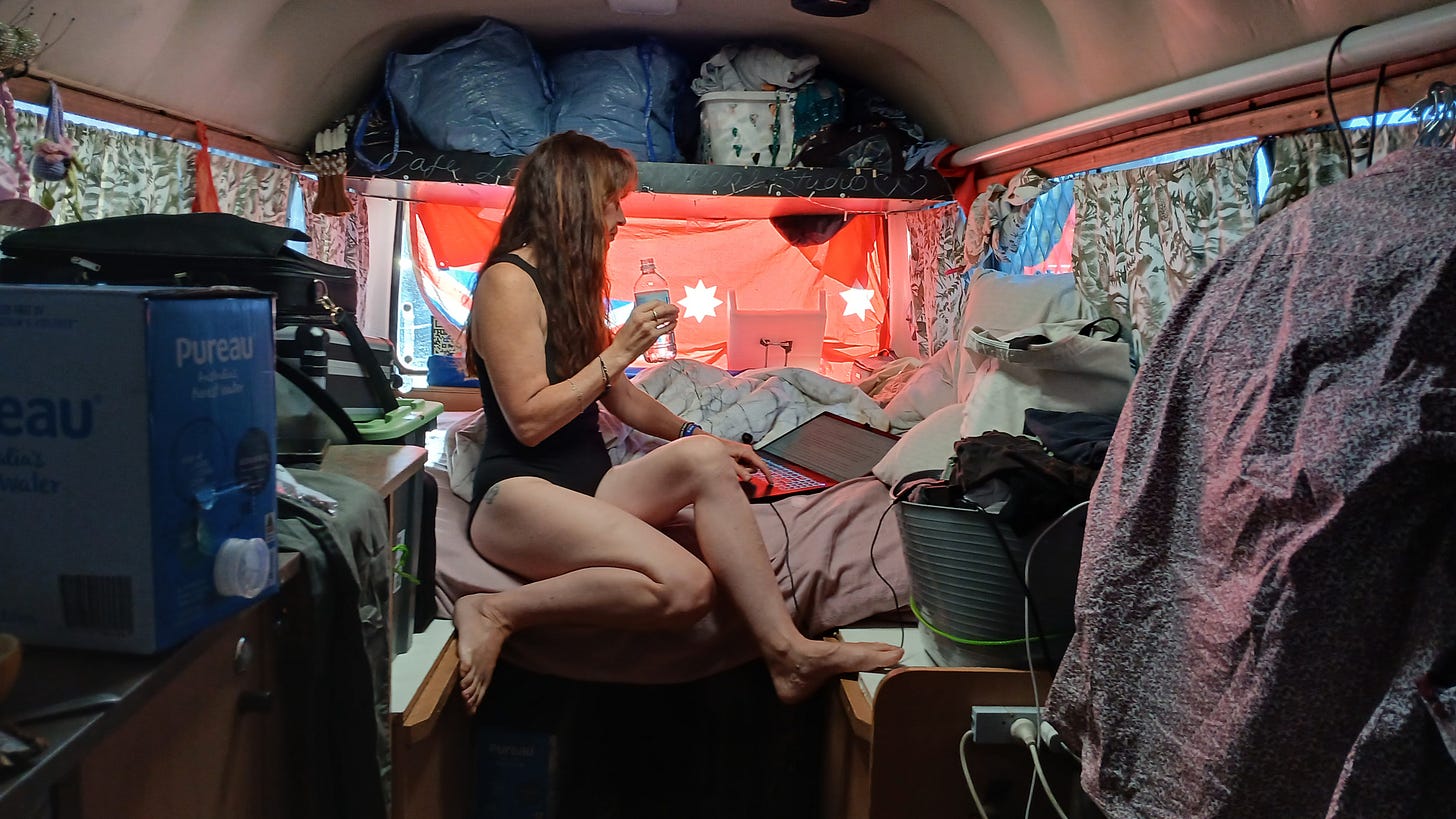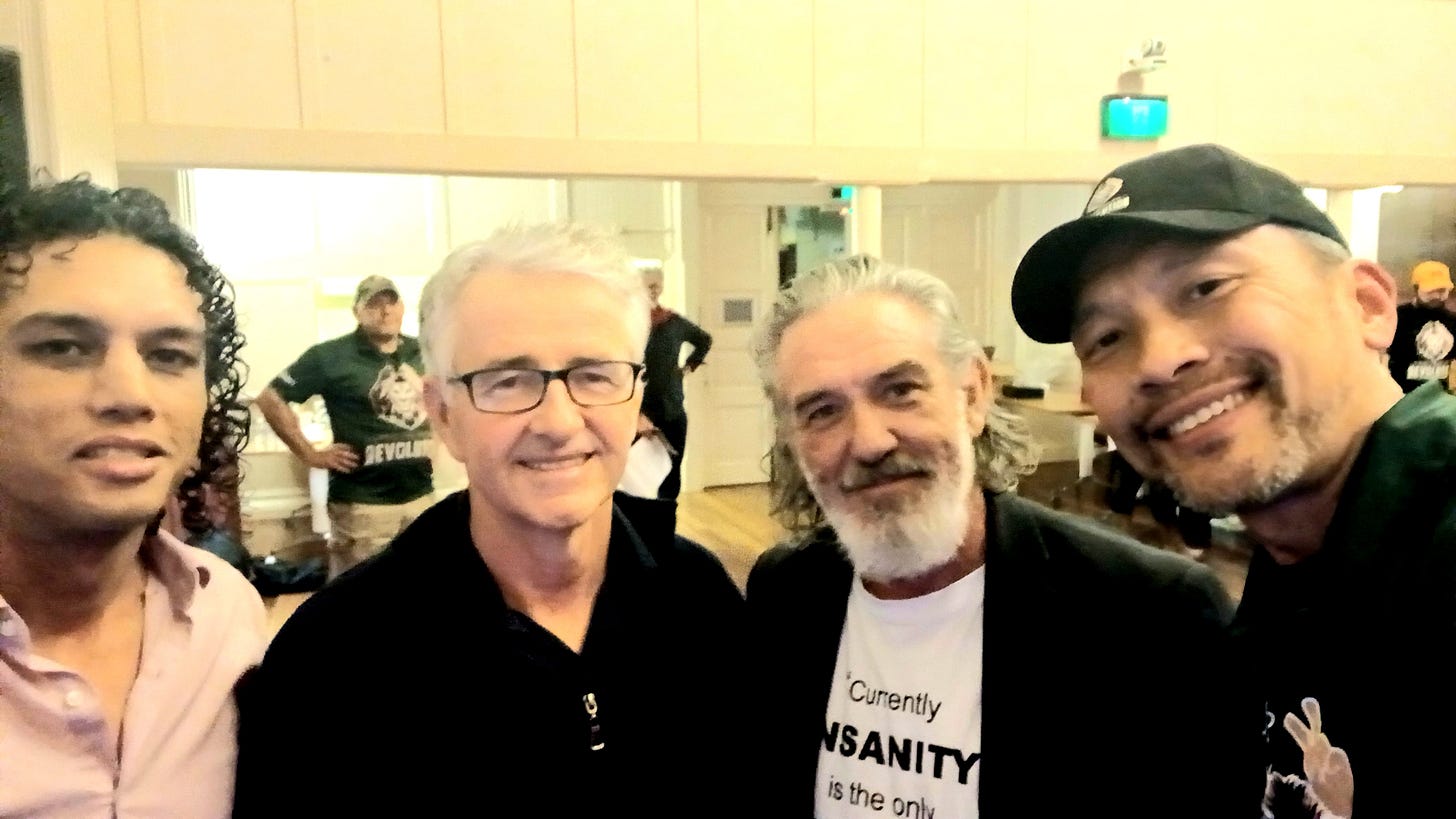It's evening, and the day has succumbed to hiding in the streetlights, the IGA, and the Laundromat, where Kelli waits by the dryers. Fruit bats flail overhead, their leathery wings sounding as if they're forgetting how to fly. In the bus, I prepare the podcast gear for tonight's show. Our studio is the back parking lot of this small string of shops, where Florence glows under the security lights.
Life on the road. Im MGG
The next day, we head to Ipswich, unaware of the Aussie diamond we accidentally kick out of the shadows of time. Myra is the first to seek us out. In the mid-eighties, she tells us how she ended up in the hospital for weeks, sent there, she claims, by a problematic vaccine that gave her a double pneumonia. That was the reason she said no to the COVID vaccine, and she told her husband, of sixty years, that he wasn't taking it either. And he didn't.
Then she invited us to camp outside her house, which is what we did. Our first night in Ipswich. We'd found little today in the way of interviews. Several were booked online, but the goal was to find the alluvial jewels scattered down the country towns' quiet roads and the suburban streets, each house with its widescreen TVs and theaters visible from the road.
Life on the road. Im MGG. We broadcasted from here that night.
Maurie has a large ulcer on his leg that won't heal, and initially, the conversation is about the slow and ongoing train wreck of his physical health, from fractured hips to an eyelid that won't close. He then goes on to talk about his childhood, which was poor and tough, and I won't elaborate unless I receive the OK from Maurie later.
But to round it up, after surviving that, he became a pastry cook in a bakery in Ipswich. Pies, sausage rolls, cakes, and cookies, all made fresh daily. Being a cook would be his life's work, but his love was ballroom dancing. Both children of the war, their adolescence was in the fifties. Before the Beatles, before Chuck Berry, when Frank Sinatra and the Rat Pack were all the rage.
"I loved it," Maurie said. "I could have danced all night."
"And he would," said Myra. "I was OK at the quickstep, but I couldn't waltz for quids, so I would let him go dance with all the girls who knew how to dance properly, but the last dance was always mine."
Maurie in the rear, with Myra and other members of the Ipswich 8:32 People Power Group
He went on to tell me how Ipswich had a great dance hall with a floor built upon springs, which just allowed you to float across it. But on weekends, they'd pile into their cars and head to the smaller towns and their halls.
I often notice these halls. Each like a forgotten museum piece, all with the "hall for hire" signs outside, and inside, the memory of a golden age, imbued in the well-worn boards of their small stages or in their pressed-tin roofs.
So here, Maurie was populating these halls with the ghosts of his youth, whose FJ Holdens and the like were parked outside. But then a question uncovered that day's diamond.
"So how did you learn to dance?" I asked him. "Did you do lessons?"
Interview and photographing Terri: Im Kelli
The smile that emerged on this old man's face briefly lifted his soul out of his pains and took us to a memory that few, if any, had seen. He'd been sent to work in a bakery in Toowoomba for three months. There, he struck up a relationship with another apprentice, who was a dancer. And when the cakes were all baking, and in those moments where the shop had no customers, this apprentice would say, "Come on, then," and together, in their flour-dusty aprons and boots, they'd waltz along the kitchen floor.
Terri and her tattooed arm dedicated to her mother, Heather.
Im Mgg
And even though that actual moment is gone, and even though life had many other challenges waiting for him, including the underrated mediocrity of a suburban existence that over time can douse all the fairy lights of your soul, time didn't get this one.
Can't you see the morning sun pouring through the sash and cord windows, as maybe with the radio on, its tinny sound filtering Mel Tormé, as these two young men, arm in arm, danced as they honed their skills to go searching the weekend for a good time and love? Maurie found love with Myra. Soon they would be celebrating their sixtieth anniversary.
But under the promise of that, I could see Myra's fear of losing him. For with no one in her immediate circle agreeing with her stance not to get vaccinated, who would she talk to once her dance partner had left?
The next morning, some of their little group turned up—people who had lost their jobs in the mandates and found each other in other groups, which had evolved into this group of twenty or so non-compliers.
Later that day, I'd be interviewing Lindsay, a psychologist, who has her own views on the current state of the world. But here now, with a new day of mining stories before us, I am writing this in Florence, who is parked in a golf course car park. And as my fingers type, all I can still see is Maurie and his mate dancing in that bakery, as though the miner in my soul was turning this diamond over and over in its hand.
Kelli, proofreading this piece.
Golf Course Carpark Ipswich, last nights camp.
Searching For You
Hanging with Royalty: Im Kelli
Australia has never remained the same. Throughout our brief history, we have constantly changed, yet somehow, we have always remained Australia.
But then the COVID years hit us with a tsunami of fear that washed away our communal identity, leaving us silently trying to ignore an undercurrent of shame.
This left us with a question that is still impolite, but essential to ask:
Who are we now?
Despite living in what should be one of the richest countries in the world, we ow a trillion dollars, and many are struggling financially, and feel powerless—even worthless, in the face of great change.
Why?
We’ve had to face challenges before.
And, if we, as a people, through conversation and action, don’t find a way to agree on our current identity—or on an identity we should strive to be—then big business, the government, and the mainstream media will create an identity for us that suits their needs, and we will have to live under it.
So, before that happens, we’ve decided to hit the road again.
Café Locked Out started in the depths of the Melbourne Lockdowns but has grown into a community of podcasters, all defending free speech in their own way.
For our part, Kelli and I, like modern-day apprentice historians, are interested in continuing the work of recording anyone who is will to share their stories and opinions.
Who are we now?
Where are we going?
And if we don’t want to go there, what other options are open to us?
Our goal is to continue to travel from town to town, posting the voices we record in an attempt to foster this conversation.
For how can will we ever defend ourselves from those who would oppress us if we don’t actually know who we are?
Michael & Kelli











Listening to the William Makis interview at the moment. I always enjoy checking out your interviews.
One man you might be interested in getting on is Dr Tom Cowan. He says that the Heart Is Not A Pump. A short clip of him here on the cause of heart attacks.
https://rumble.com/v4jgtmb-dr-tom-cowan-what-really-causes-heart-attacks-15.03.2024.html?e9s=src_v1_s%2Csrc_v1_s_o
That was a fascinating chat last night. Might make a few clips from it for X.